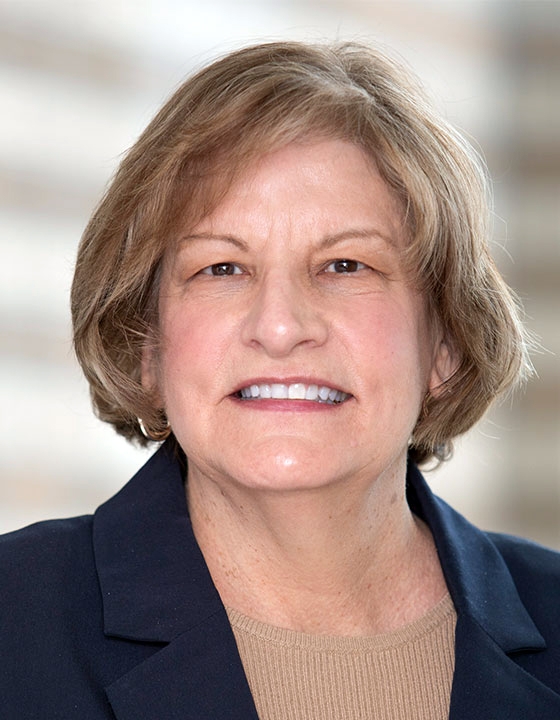
Endress is helping to counter the political divide in America by teaching her students to distinguish fact from fiction when sourcing their news.

RIC Associate Professor of Communication Valerie Endress is a frequent political analyst during campaign season on NBC 10, GoLocalProv and a variety of other media outlets. She’s a Rhode Island political forecaster for national publications and a regular guest on “Rethink the Week,” a nationally syndicated radio show about national politics.
Along with teaching courses on political communication and civic engagement, Endress leads the American Democracy Project at RIC and the Congress to Campus program, which is a unique opportunity for students to engage in frank dialogues with former and current members of Congress.
In this Q&A, Endress discusses the hostility and divisiveness in American politics and how she is training RIC students in critical thinking and “civil” discourse.
Endress believes it is imperative that students have experiences with democratic processes and that they learn civic skills such as critical thinking and active listening, particularly when there are opposing views and perspectives.
“Higher education was designed to make us better citizens,” she says. “It wasn’t originally designed to get us a good job.” Therefore, it is imperative, she says, that higher education prepare students with the knowledge, skills and experiences to be fully engaged and informed, ready to tackle current and future societal issues.
QUESTION: Today, Democrats and Republicans are farther apart ideologically than at any time in the past 50 years, according to a Pew Research Center analysis. Why have their disagreements become so filled with vitriol and how does the online world serve to deepen that polarization?
ENDRESS: Today we have at our finger tips more access to information than we’ve ever had in the past. I remember as a child you had a choice between three news stations: CBS, NBC and ABC. We all consumed, more or less, the same news. We supplemented that with the Providence Journal newspaper and Time and Newsweek magazines. No wonder there was less disagreement. Our sources of information were quite limited.
But with the advent of the Internet, there came an explosion of information – false information that appears to be legitimate. Today, foreign-operated, fake, social media accounts are able to spread misinformation, and then social media users unwittingly spread it further. There are bots, now, powered by artificial intelligence, that can write a news article in five seconds that looks completely legitimate.
QUESTION: But politicians themselves misinform and manipulate the truth, don’t they, if they think it will give them a political advantage?
ENDRESS: Yes. Donald Trump stood apart, in that respect. The Washington Post fact-checked over 30,000 lies he committed during his term in office. We can be rightfully appalled. It sets a cultural norm that allows us – and even encourages us – to make false claims on social media without any repercussions.
QUESTION: Do people really care that they’re reading false claims and fake news?
ENDRESS: People believe that they’re well-informed, but the majority of people have lost their tolerance for reading beyond the headlines or the first two lines. If they see a sensational headline, they don’t ask themselves is this true and how can I find out if this is true?
QUESTION: How do you teach students to distinguish between fake news and valid sources of information?
ENDRESS: In every course that I teach, regardless of the subject matter, I give my students a chart that shows which news sources tend to lean right, which tend to lean left and which tend to be more in the middle. The ones in the middle are going to be more credible or accurate, such as NPR and the Associated Press. It’s the same research skills that professors have been teaching for decades. Look for the most credible sources. Make sure that your hypothesis can be verified. Make a commitment to fact-checking.
There was a time when media outlets were positioned more in the middle. The fairness doctrine [introduced in 1949] required media outlets to present controversial issues of public importance and to do so in a manner that fairly reflected both sides of the controversy. In other words, if you had a conservative on your radio show, you needed to have a liberal on the show, as well. But that doctrine was struck down in the late 1980s because it was said to violate freedom of speech. Media outlets argued that they have the right to produce the content of their choice.
As a result, we have, today, partisan-oriented media outlets. We choose media that most closely fits our ideological perspective. We live next to people who most closely fit our ideological perspective. We’re not in the marketplace of new ideas anymore. We’re in the marketplace where we reinforce what we already believe.
QUESTION: How can the media help heal the partisan divide?
ENDRESS: Focus on the issues. During the 2016 presidential election, MSNBC was more likely to report on the accusations Trump was leveling against Hillary Clinton than talk about Clinton’s policies. There were days when you didn’t even know Clinton was running for president. By focusing on Trump, MSNBC brought in more viewers who could express their outrage and engage in diatribes against him. The media conglomerates made a lot of money. Donald Trump was media gold.
QUESTION: Aren’t these outlets smart enough to know that they’re helping to elect the next president by focusing on them? Is making money more important than who is running the country?
ENDRESS: Yes. Absolutely. They’re media conglomerates.
QUESTION: So, the same doctor who is helping you, is killing you?
ENDRESS: (Laughter) That’s a good way to look at it.
QUESTION: So, the media plays into political polarization by their own partisan-oriented focus, and this good-vs-evil, dark-vs-light, us-against-them thinking that is so pronounced in American politics is echoed in how the media reports the news?
ENDRESS: Yes. And political systems mirror what’s happening to us personally. In America, we’ve lost our sense of community. We’ve become such a mobile society that we no longer know our next-door neighbors. We’re much more likely to sue our next-door neighbor if we trip on their sidewalk than to help them repair the sidewalk. Social media further divides us. We don’t get together like we used to. We’re more likely to stay at home and watch a movie than go out to a movie. We’re more likely to order in than go to a restaurant. The majority of people who date, talk online rather than face to face. And we’re more likely to attack a person via cyberspace than face to face.
Every professor will tell you this. You walk into the classroom on the first day and all the lights are off because students don’t need the light. They’re not talking to each other. They’re looking at their phones. Very seldom will they talk to the person who’s sitting next to them. We’ve lost our sense of community. The same can be said for members of Congress.
There was a time when Congress members would stay in Washington and only come home during recess. While they were in Washington, party leaders might go out to dinner together to hammer out a bill, they might attend the same PTA meeting or watch their kids play softball together. If I know you and I get to know your family and your children, I’m much more likely to cooperate with you. That’s not the case anymore. Today, members of Congress are in Washington on Tuesday and Wednesday but return to their home states on Thursday and stay throughout the weekend to fundraise. They don’t get to know the people on the other side of the aisle.
Ultimately, for all the talk about the negative consequences of hostile political rhetoric, what we don’t pay attention to is the quieter consequences and that is the loss of friends, of family, of associations that have been severed because of differing political views. Nearly 20 percent of voters reported that this political divide had hurt their personal relationships and their family relationships. It’s time we healed the divide.
Also see “The Q&A: Prof. Endress Discusses How to Heal the Partisan Divide.”
See Rhode Island College’s Department of Communication, for information about our major and concentrations.
